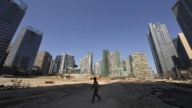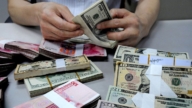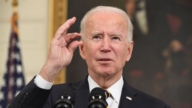【新唐人2013年06月26日讯】6月24号,中国股市沪指击穿2000点大关,25号,A股继续下跌,大盘上演所谓“蹦极(Bungee Jumping) ”,上证指数一度触及1849.65点,尾盘报收1959.51点。经济学家普遍认为,银行的“钱荒”传导到股市,各路资金竞相撤离,投资者恐慌情绪蔓延,中国系统性的金融危机已经爆发,全面经济危机一触即发。
中国在最近出现,各大城市的中国银行、和工商银行转账全面暂停,而网银、柜台等都无法操作,之后,股市也出现狂泻现象。24号,上证综合指数收盘下跌5.3%,创近四年来最大单日跌幅,跌破2000点大关,而银行类股引领跌潮。
中国“中央财经大学”金融学院教授韩复龄向媒体公开表示, 中国系统性的金融危机已经爆发。
马来西亚金融专家蔡伟强:“尤其中国的股市很多都是投机客,有钱荒,银行可能潜在爆发金融危机,很多他们就会撤走,就会带来很剧烈的跌幅。”
“北京大学”经济学教授夏业良早在在2010年预言,中国可能在2012年至2015年间产生经济危机。夏业良说,现在金融危机已经一触即发,经济危机也只是一个临爆点的问题。
北京大学经济学教授夏业良: “有几个方面的原因,一个是通货膨胀,通货膨胀是怎么产生的呢﹖是因为外汇储备,它倒逼人民币账款,多印钞票,多印了多少呢﹖ 6倍以上﹗就稀释人民币的购买力,在国内人民币是贬值的,在国外它是升值的,加上地方政府大量发行地方债,这个总量也差不多有20万亿,另外几大商业银行,特别是国有商业银行发行各种债券、还有表外的业务,还有大量的非银行经营资产,还有其他的一些业务,造成了实际上流动性的泛滥。”
夏业良指出,这种流动性的泛滥,使中国的经济在一段时间里看起来很红火,实际上却给中国经济危机埋下了种子。
1988年和1994年,中国银行曾经出现两次“钱荒”,造成两位数的通货膨胀。按照惯例,当时的银行就应该倒闭。夏业良说,当时是计划经济,银行能蒙混过关,最后上市前,40%的坏账率由国有资产管理公司接过,一笔勾销,由十几亿中国人民买单。银行以全部优良资产上市后,在股市中圈到大量金钱,可是银行却以低价引进国外银行,让国外银行把钱赚走。
夏业良: “就很多外资银行到中国的银行持有大量的股份,而且是原始股的价钱买的,甚至还低于发行价,基本上都低于发行价,他们赚了大笔的钱,他们前一段时间在不断的套现,所以这个情况就造成对中国老百姓很苛刻,就银行的储蓄和各方面的服务,对老百姓很苛刻,挣到的钱大量的奉送给了外国资本。”
“台湾大学”经济系教授张清溪认为,目前中国大陆银行的“钱荒”和股市大跌,显示中国的经济危机可能已经开始。
台湾大学经济系教授张清溪:“经济危机随时都可能爆发,现在也可能在爆发,货币供给太多,现在就是怕继续发行货币造成更不可收拾,所以造成现在这种结果。”
有评论认为,中国目前出现的信贷紧缩,是总理李克强领导的经济团队,在给中国银行业做外科手术,局面仍在央行的控制之中,目地是逼迫各大银行从泡沫中主动脱身。
夏业良:“中国经济现在有很多的危机,金融危机是一个方面,另外它的制造业本身,经济结构本身,它存在大量的问题,现在经济增加速度放慢,一方面是中央政府希望它降下来这个速度,另一方面客观条件限制它,因为出口竞争,你如果没有创新力,没有新的产品,只是靠原来的那种低价策略,这已经难以再维持下去了。”
美国“南卡罗莱纳大学”艾肯商学院教授谢田,从去年开始已经提醒中国民众,中国的经济已经“硬着陆”,要看好自己的钱袋子。
采访编辑/刘惠 后制/钟元
Experts: Financial Crisis Has Broken Out in China
On June 24, the Shanghai Stock market fell to 2,000 points.
On June 25, A shares continue to fall.
The market staged a so-called “Bungee Jump."
The Shanghai index touched 1,849.65 points,
closing at 1,959.51 points.
Economists generally say the bank’s “money shortage"
has spread to the stock market.
Investors are in panic and are withdrawing money.
China’s systemic financial crisis has erupted,
and a comprehensive economic crisis may be imminent.
Recently, transactions, online banking and tellers for
Bank of China and ICBC in China’s large cities were temperately shut down,
followed by stock market dramatically slumped.
On June 24th, the Shanghai Composite Index fell 5.3%,
the highest single-day decline in nearly four years,
to below 2,000.
Bank stocks had the largest decline.
Han Fuling, professor at China’s Central University
of Finance and Economics openly told the media that
China’s systemic financial crisis has erupted.
Malaysian financial expert Cai Weiqiang: “In particular
there are many speculators in China’s stock market.
With money shortage, financial crisis could potentially erupt.
Many will withdraw capital and cause severe decline."
Beijing University professor of Economics Xia Yeliang
predicted as early as 2010 that
China might have economic crisis between 2012-2015.
Xia Yeliang said the financial crisis is now imminent,
and the economic crisis is also about to explode.
Professor Xia Yeliang: “There are several reasons for this.
One is inflation. How does inflation happen?
Foreign exchange reserves pressure of overprinting RMB bills.
How much more was printed? Over six times more!
This leads to dilution of the purchasing power of RMB.
As RMB currency devalues in China, overseas it appreciates.
Also, local governments issuing large amounts of bonds,
totaling up to nearly 20 trillion yuan,
large commercial banks, especially state-owned issuing bonds,
a variety of off-balance sheet business, non-banking assets,
as well as some other business, all result in excess liquidity."
Xia Yeliang pointed out that this kind of excess liquidity
makes China’s economy looks very prosperous for some time.
In fact, it sowed the seeds of economic crisis.
In 1988 and 1994, Bank of China had two
“money shortages," and caused double-digit inflation.
The bank should have gone bankrupt.
Xia Yeliang says the planned economy at that time
helped banks to muddle through.
Before it went to the stock market, 40% of the bad debt
was taken over by state-owned asset management,
written off and paid for by the millions of Chinese people.
The banks were listed with all good assets
and get lots of money from the stock market.
But the bank, introduced foreign banks at a low price,
allowing foreign banks to make money.
Xia Ye Liang: “Many foreign banks hold
a large amount of banks stocks in China.
They purchased it at the original price, even lower
than the IPO price, and they earned lots of money.
A while ago, they kept cashing in the money.
This is very harsh for the China’s people.
Bank saving and service conditions are harsh to Chinese people.
Their hard earned money was given to foreign capital."
Professor of Economics Zhang Qingxi at National Taiwan
University believes the “money shortage"
and the stock market crash in China show that
China’s economic crisis may have begun.
Zhang Qingxi: “Economic crisis could erupt at any time.
Too much money was supplied.
Right now there is the fear that
continuing to issue money might be unmanageable.”
Commentators believe the current credit crunch is because
Premier Li Keqiang giving China’s banking system surgery.
Chinese central government is still controlling the situation,
forcing major banks to take the initiative to get away from the bubble.
Xia Ye Liang: “China’s economy has many crises.
The financial crisis is one aspect.
Additionally, its manufacturing sector and
economic structure have lots of problems.
Regarding the current slow down, on one hand,
the central government hopes to slow it down;
on the other hand, it’s due to objective conditions.
Without innovation or low-priced products,
the original low-cost strategy is hard to
maintain export competitiveness.”
University of South Carolina Aiken Business School
professor Xie Tian reminded people since last year that
China’s economy has ‘landed hard,’
and people need to watch their wallets.


























